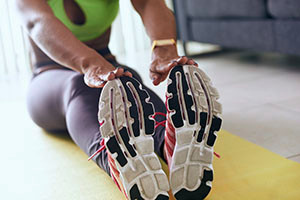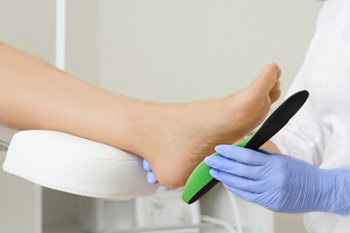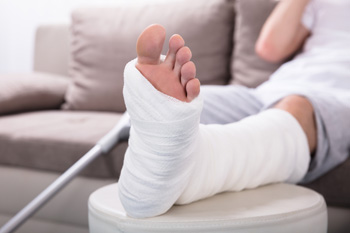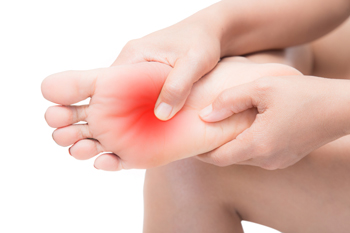
 The benefits of incorporating running into a frequent routine can include burning excess calories and toning the body. Despite the benefits people may experience from running, there are a variety of foot injuries that can occur. These can include black toenails, which can happen from the nail consistently hitting the top of the shoe. This can cause bleeding underneath the toenail, and the nail may gradually fall off. Additionally, plantar fasciitis can result from wearing shoes that do not fit correctly, or from running on uneven surfaces. Patients may develop blisters and heel spurs, which can make it painful to run. If you would like more information about how to prevent running injuries, it is recommended that you confer with a podiatrist who can address any concerns that you may have.
The benefits of incorporating running into a frequent routine can include burning excess calories and toning the body. Despite the benefits people may experience from running, there are a variety of foot injuries that can occur. These can include black toenails, which can happen from the nail consistently hitting the top of the shoe. This can cause bleeding underneath the toenail, and the nail may gradually fall off. Additionally, plantar fasciitis can result from wearing shoes that do not fit correctly, or from running on uneven surfaces. Patients may develop blisters and heel spurs, which can make it painful to run. If you would like more information about how to prevent running injuries, it is recommended that you confer with a podiatrist who can address any concerns that you may have.
Exercising your feet regularly with the proper foot wear is a great way to prevent injuries. If you have any concerns about your feet, contact one of our podiatrists of Achilles Foot Clinic. Our doctors will treat your foot and ankle needs.
How to Prevent Running Injuries
Many common running injuries are caused by overuse and overtraining. When the back of the kneecap starts wearing out and starts causing pain in your knee, this is commonly referred to as runner’s knee. Runner’s knee is a decrease in strength in your quadriceps and can occur if you’re not wearing properly fitted or supporting shoes. To prevent runner’s knee, focusing on hip strengthening is a good idea, as well as strengthening your quads to keep the kneecaps aligned.
What Are Some Causes of Running Injuries?
- One cause of a common running injury is called iliotibial band syndrome.
- Plantar fasciitis is also another common injury.
- Stress fractures can occur from overtraining, lack of calcium, or even your running style.
Best Ways to Prevent Running Injuries
- Wear footwear that fits properly and suits your running needs.
- Running shoes are the only protective gear that runners have to safeguard them from injury.
- Make a training schedule. Adding strengthening exercises as well as regular stretching can help keep you strong and limber and can lessen the possibility of injuries.
- Stretching keeps muscles limber; this will help you gain better flexibility.
If you have any questions, please feel free to contact one our office, located in the South of Calgary, Alberta. We offer the newest diagnostic and treatment technologies for all your foot care needs.
 Orthotics are inserts that are worn inside of the shoes to correct issues with foot deformities, foot alignment, or to relieve pressure from various foot conditions. Orthotics can help relieve foot pain, knee pain, and lower back pain as well. There are 3 common types of orthotics including: soft, rigid, and semi-rigid. Soft orthotics are designed to cushion the foot when planted on the ground. Semi-rigid orthotics are designed to provide a middle ground between stability and cushioning and are often used for patients with flat feet. Rigid orthotics are designed to control movement in the foot that causes pain. If you believe that orthotics may be right for you, please consult with a podiatrist for professional advice. A podiatrist will custom make your orthotics to maximize your experience.
Orthotics are inserts that are worn inside of the shoes to correct issues with foot deformities, foot alignment, or to relieve pressure from various foot conditions. Orthotics can help relieve foot pain, knee pain, and lower back pain as well. There are 3 common types of orthotics including: soft, rigid, and semi-rigid. Soft orthotics are designed to cushion the foot when planted on the ground. Semi-rigid orthotics are designed to provide a middle ground between stability and cushioning and are often used for patients with flat feet. Rigid orthotics are designed to control movement in the foot that causes pain. If you believe that orthotics may be right for you, please consult with a podiatrist for professional advice. A podiatrist will custom make your orthotics to maximize your experience.
If you are having discomfort in your feet and would like to try orthotics, contact one of our podiatrists from Achilles Foot Clinic. Our doctors can provide the care you need to keep you pain-free and on your feet.
What Are Orthotics?
Orthotics are inserts you can place into your shoes to help with a variety of foot problems such as flat feet or foot pain. Orthotics provide relief and comfort for minor foot and heel pain but can’t correct serious biomechanical problems in your feet.
Over-the-Counter Inserts
Orthotics come in a wide variety of over-the-counter inserts that are used to treat foot pain, heel pain, and minor problems. For example, arch supports can be inserted into your shoes to help correct overarched or flat feet, while gel insoles are often used because they provide comfort and relief from foot and heel pain by alleviating pressure.
Prescription Orthotics
If over-the-counter inserts don’t work for you or if you have a more severe foot concern, it is possible to have your podiatrist prescribe custom orthotics. These high-quality inserts are designed to treat problems such as abnormal motion, plantar fasciitis, and severe forms of heel pain. They can even be used to help patients suffering from diabetes by treating foot ulcers and painful calluses and are usually molded to your feet individually, which allows them to provide full support and comfort.
If you are experiencing minor to severe foot or heel pain, it’s recommended to speak with your podiatrist about the possibilities of using orthotics. A podiatrist can determine which type of orthotic is right for you and allow you to take the first steps towards being pain-free.
If you have any questions, please feel free to contact one our office, located in the South of Calgary, Alberta. We offer the newest diagnostic and treatment technologies for all your foot care needs.
 A broken foot can happen as a result of falling or enduring a sudden injury. The healing process can begin when a proper diagnosis is performed, which generally means having an X-ray taken. This is commonly followed by wearing a protective boot or cast, and it may help existing swelling when the foot is frequently elevated. The boot or cast may aid in walking while attempting to complete daily activities. If the fracture is severe, and the bone is protruding from the skin, surgery may be necessary for proper healing. It is suggested that you consult with a podiatrist if you have broken your foot.
A broken foot can happen as a result of falling or enduring a sudden injury. The healing process can begin when a proper diagnosis is performed, which generally means having an X-ray taken. This is commonly followed by wearing a protective boot or cast, and it may help existing swelling when the foot is frequently elevated. The boot or cast may aid in walking while attempting to complete daily activities. If the fracture is severe, and the bone is protruding from the skin, surgery may be necessary for proper healing. It is suggested that you consult with a podiatrist if you have broken your foot.
A broken foot requires immediate medical attention and treatment. If you need your feet checked, contact one of our podiatrists from Achilles Foot Clinic. Our doctors can provide the care you need to keep you pain-free and on your feet.
Broken Foot Causes, Symptoms, and Treatment
A broken foot is caused by one of the bones in the foot typically breaking when bended, crushed, or stretched beyond its natural capabilities. Usually the location of the fracture indicates how the break occurred, whether it was through an object, fall, or any other type of injury.
Common Symptoms of Broken Feet:
Those that suspect they have a broken foot shoot seek urgent medical attention where a medical professional could diagnose the severity.
Treatment for broken bones varies depending on the cause, severity and location. Some will require the use of splints, casts or crutches while others could even involve surgery to repair the broken bones. Personal care includes the use of ice and keeping the foot stabilized and elevated.
If you have any questions, please feel free to contact one our office, located in the South of Calgary, Alberta. We offer the newest diagnostic and treatment technologies for all your foot care needs.
Read more about Causes, Symptoms, and Treatment for a Broken Foot
 Peripheral neuropathy is the result of nerve damage that occurs in the extremities such as the hands and feet. When this peripheral neuropathy is inherited, it is known as Charcot-Marie-Tooth, or CMT. Charcot-Marie-Tooth affects people worldwide. While CMT is not life threatening, it does lead to the loss of mobility and function in the extremities as the nerves degenerate. There are many different genetic causes for CMT, but most cases have a variety of similar symptoms. These symptoms include having high arched feet, structural foot deformities and weakening of the muscles. Patients who are suffering from CMT should consult with a podiatrist for treatment options that can help improve function. Treatment options may include physical therapy, bracing, wearing properly fitting footwear, and maintaining a healthy weight.
Peripheral neuropathy is the result of nerve damage that occurs in the extremities such as the hands and feet. When this peripheral neuropathy is inherited, it is known as Charcot-Marie-Tooth, or CMT. Charcot-Marie-Tooth affects people worldwide. While CMT is not life threatening, it does lead to the loss of mobility and function in the extremities as the nerves degenerate. There are many different genetic causes for CMT, but most cases have a variety of similar symptoms. These symptoms include having high arched feet, structural foot deformities and weakening of the muscles. Patients who are suffering from CMT should consult with a podiatrist for treatment options that can help improve function. Treatment options may include physical therapy, bracing, wearing properly fitting footwear, and maintaining a healthy weight.
Neuropathy
Neuropathy can be a potentially serious condition, especially if it is left undiagnosed. If you have any concerns that you may be experiencing nerve loss in your feet, consult with one of our podiatrists from Achilles Foot Clinic. Our doctors will assess your condition and provide you with quality foot and ankle treatment for neuropathy.
What Is Neuropathy?
Neuropathy is a condition that leads to damage to the nerves in the body. Peripheral neuropathy, or neuropathy that affects your peripheral nervous system, usually occurs in the feet. Neuropathy can be triggered by a number of different causes. Such causes include diabetes, infections, cancers, disorders, and toxic substances.
Symptoms of Neuropathy Include:
Those with diabetes are at serious risk due to being unable to feel an ulcer on their feet. Diabetics usually also suffer from poor blood circulation. This can lead to the wound not healing, infections occurring, and the limb may have to be amputated.
Treatment
To treat neuropathy in the foot, podiatrists will first diagnose the cause of the neuropathy. Figuring out the underlying cause of the neuropathy will allow the podiatrist to prescribe the best treatment, whether it be caused by diabetes, toxic substance exposure, infection, etc. If the nerve has not died, then it’s possible that sensation may be able to return to the foot.
Pain medication may be issued for pain. Electrical nerve stimulation can be used to stimulate nerves. If the neuropathy is caused from pressure on the nerves, then surgery may be necessary.
If you have any questions, please feel free to contact one our office, located in the South of Calgary, Alberta. We offer the newest diagnostic and treatment technologies for all your foot care needs.